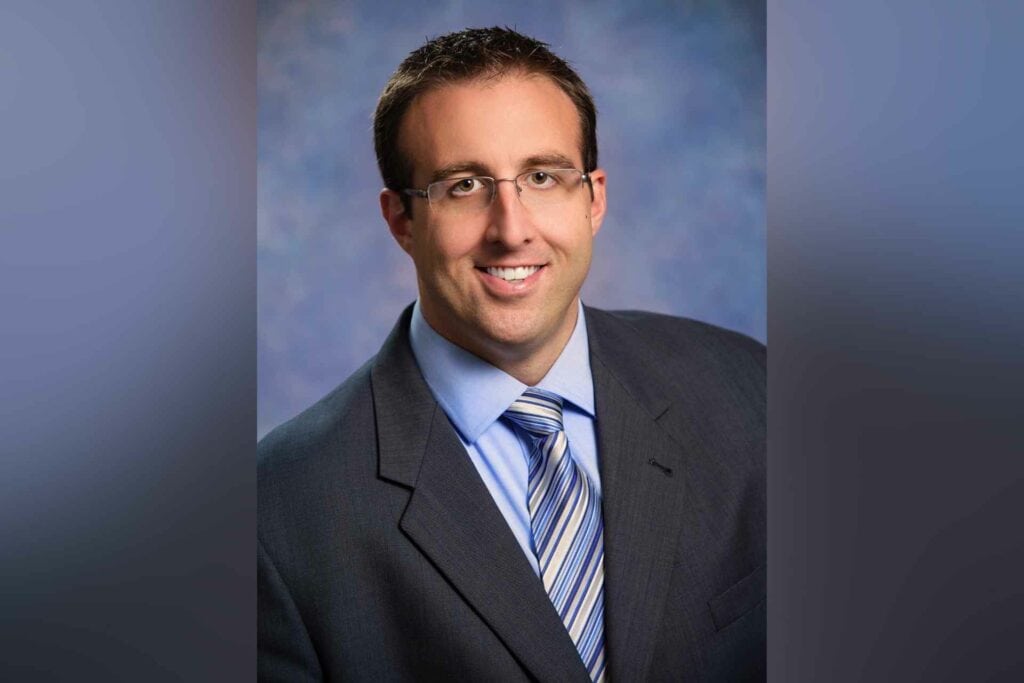BUCKHANNON – During his time leading the Upshur County Economic Development Authority, the UCDA office has moved from Mud Lick Road to Main Street; local and state economies have begun transitioning from coal and natural gas to industries that include green energy and medical marijuana; and his own, unique idea has morphed into ‘the IDEA.’
Seeing the three-story, 24,000-square-foot Innovation Center, which contains the IDEA shared co-working space (an acronym for Innovate, Develop, Educate and Advance), come to fruition on Main Street is one of the accomplishments UCDA executive director Rob Hinton is most proud of as he prepares to move on to a new post.
The Development Authority announced in a press release Friday that Hinton, who has led the UCDA since August 2014, had submitted his resignation.
“Robert Hinton, UCDA executive director, will be leaving the agency to pursue other opportunities,” Skip Gjolberg, UCDA Board President and St. Joseph’s Hospital CEO, said in the release. “Rob has done a great job promoting economic growth here and establishing our new Innovation Center on Main Street. We are sorry to see him go but wish him and his family the best. We are pleased that while he will be moving on to other opportunities, he will be staying in Buckhannon.”
Inside his office on the second floor of the Innovation Center Friday, Hinton said seeing his vision of a shared, co-working space that provides a convenient, affordable place for startups and remote workers to rent on a month-to-month basis morph from a concept into a concrete reality has been the most rewarding part of his tenure as UCDA executive director. Not only is the state-of-the-art co-working space — typically found only in larger, urban areas — now a reality in rural north-central West Virginia, but tenants now occupy the rest of the building, too.
The third floor is home to West Virginia Hospice, the LHC Group; the Region VII Planning & Development Council (and the UCDA) have office space on the second floor; and Boost Mobile is located on the first floor. Moreover, Klie Law is in the midst of a buildout as it prepares to move its headquarters to the heart of Main Street.
“Seeing the Innovation Center actually go from an idea to a reality, filling it up, and seeing people use the coworking space and actually liking it, is really neat,” Hinton said. “My biggest fear was we would build this building and it would be empty, which would just be a total nightmare, but now that it’s built and we’ve filled up, I feel OK with moving on.”
Hinton is keeping where he’s going quiet for now, but says he’ll likely stay at the UCDA through June or until the board can find a replacement. Hinton said he hadn’t been looking to leave, but an opportunity arose, and he decided to accept it.
In addition to getting the Innovation Center building built, Hinton is happy he’s been able to attract two medical marijuana growers/processors to the area – one that’s planning to open up shop in the old armory along Route 20 South and another at a yet-to-be-constructed facility on Brushy Fork Road.
Each company is projected to create 80 to 100 new jobs in the area over the next three years.
“The way I’ve always looked at medical cannabis is, it’s legal in the State of West Virginia, so there is going to be an industry not only from the medical side but from the industrial side based on the plant byproducts,” Hinton said. “I knew this was unique in that these companies have to be located in West Virginia, so they can’t locate outside and ship product in. They have to come here, they’re going to have to create jobs here, so let’s figure out a way to get them to Upshur County.”
The Akron, Ohio native ended up in Buckhannon when he came here to help coach football, earn his MBA and work as a graduate assistant at West Virginia Wesleyan College, where he met his wife, Jackie.
Hailing from a small business background, when Hinton was selected as the new UCDA director in 2014, he knew providing resources for people trying to start their own businesses was key.
“Because I had come from a small business background, the first goal was to try and figure out how we could get a small business development person located here,” he said. “That was successful – we got Susie (Susie Higgins, business coach with the W.Va. Small Business Administration), and she’s been absolutely phenomenal. That has played into a lot of the successes we’ve had with a lot of the businesses on Main Street.”
In addition to ongoing UCDA initiatives – like advocating for the completion of Corridor H – Hinton took an asset assessment when he started.
“When I first came on board, I started trying to figure out, ‘What do we have here? What kind of place do we want to be, what do we want to be identified by?’ There was a strong push to just go and try to recruit heavy industry and manufacturing, and that’s great, but do you really want to bring in some big, huge factory that really no other community wants? I don’t think that’s what Buckhannon really wants.”
Looking at the college, St. Joseph’s Hospital and Buckhannon’s blooming Main Street, Hinton hatched the concept of building a place entrepreneurs and small business startups could call home.
“That’s when I came up with the idea that we need to try and promote startup entrepreneurship remote work and create a place where that could occur – and actually have a place that would be an item of recruitment,” he said. “I wanted it to be a place where when you’re in Buckhannon, you walk into it and think, ‘Wow, I would never expect for this to be here.’ We actually have a lot of those places here. If you look at Fish Hawk Acres, at Stone Tower Brews, at C.J. Maggie’s Restaurant, those are all places that you wouldn’t necessarily expect to be in a small town.”
Hinton began pitching the idea of the IDEA and Innovation Center to the UCDA Board in 2015, secured through the U.S. Economic Development Administration’s Partnership for Opportunity and Workforce and Economic Revitalization initiative in 2016, and the groundbreaking happened in 2018.
“It was a wild ride, but we got it done, and I think the next director coming in will have a very good launchpad to try and create more things this space can offer the community,” Hinton said.
The pandemic, for all the pain it caused, proved that remote work is not only possible, but preferable for many people.
“Productivity actually went up during the pandemic,” Hinton said. “People got more work done at home.”
The IDEA is an asset particularly now that businesses are not wanting to rent as much office space as they once did due to cutting overhead costs and emphasizing remote work, Hinton said.
“I think that a lot of companies, in order to be competitive, are going to have to maintain the remote work lifestyle,” he said. “There are people that don’t like it, but there are people that want it, and they will leave a company sometimes if it’s not an option.”
Hinton also began to understand how crucial broadband access was as a business retention and recruitment tool. He delved into researching it, and the UCDA ultimately succeeded in becoming the first local entity in about seven or eight years to obtain grant funding for broadband infrastructure.
“That in and of itself helped a lot of other communities identify that need,” Hinton said. “Since then, I think the state has given out close to $100 million in broadband funding, so that’s been exciting to watch that. We ended up successfully getting funded, and that kind of opened up the door for other communities to put in an application and get funded.”
As the former West Virginia Broadband Enhancement Council Chairman, Hinton became “a subject matter expert,” according to Gjolberg, the UCDA’s Board President.
“In the time I’ve known Rob, he’s always demonstrated a lot of initiative,” Gjolberg said. “For instance, when he became the state chair of the Broadband Council, he became a subject matter expert, and he’s been a resource for Senator (Shelley Moore) Capito on a number of occasions in that regard. He’s just done a fabulous job.”
Hinton said the job has been one of the most substantial learning experiences he’s had professionally.
“This job is just dynamic, and you’re going to be involved in a lot of different areas across every industry,” he said. “For me, learning how the public sector works and seeing what it’s like working in the public light was a learning curve. It’s transparent, so it can be challenging, and you really find out who’s against what you want to do, who’s supportive of what you want to do, and what people think you should do.”
Hinton had to, as he put it, “learn to navigate the waters” of public opinion to get done what he believed was best for the community.
The outgoing EDA director said he thinks his successor should focus on workforce development, from the standpoint of not only recruiting people interested in relocating to the area, but also developing skills and knowledge-based training for people who already live here.
“You’ll have so much more success trying to develop businesses by providing resources to people who are already here, people that want to go out on their own, that want to start a business, than you will recruiting businesses here – it’s almost 100 to 1,” Hinton said. “Attracting remote workers is good, but what about providing curriculum or training, working with the college, partnering on resources for people who are already here so that you can help them? They’re the people who think, ‘Hey, I’d like to get a remote job, what skills do I need?’ We already have people here that maybe just need a couple classes and then they’ve got a skill to get a remote job.”
While he recommends the new director work to get Buckhannon on the map of cities included in the Ascend remote worker recruitment program, Hinton thinks creating similar incentives for people who live here is just as important.
“If you’re going to give someone $12,000 to come live here, what about $12,000 to complete a job or skills training program?” he said. “I’m sure a lot of people are thinking, ‘I’m here, give me the skills so I can get one of those jobs.’”
With the extractive industries currently on the decline, Hinton’s perspective is that a healthy economy needs to incorporate industries that aren’t as volatile as the energy industry.
“Natural resources will always be a part of our economy, but we’ve got to figure out how to be strong in a way other than just extracting resources and shipping them out of state,” he said. “We’ve got to figure out, ‘How do we extract the resources but then add value in the state and create products from those resources?’ That’s something that we do a decent job with the wood products industry.”
Regarding green energy and other emerging industries like growing and processing medical marijuana, Hinton believes embracing them doesn’t mean leaving gas and coal behind.
“Those two things will always be a part of our economy, but what matters is, what’s going to drive our economy?” he said. “You don’t abandon any industry. Instead, you say, ‘How can we complement what we have to make it stronger?’ It’s not an all-or-nothing thing. We can have coal mines, we can have natural gas drilling, but we can also have green energy companies that are here manufacturing, whether it’s solar panels or fuel cells. You have to be dynamic in order to survive in the next 50 years of our economy.”













